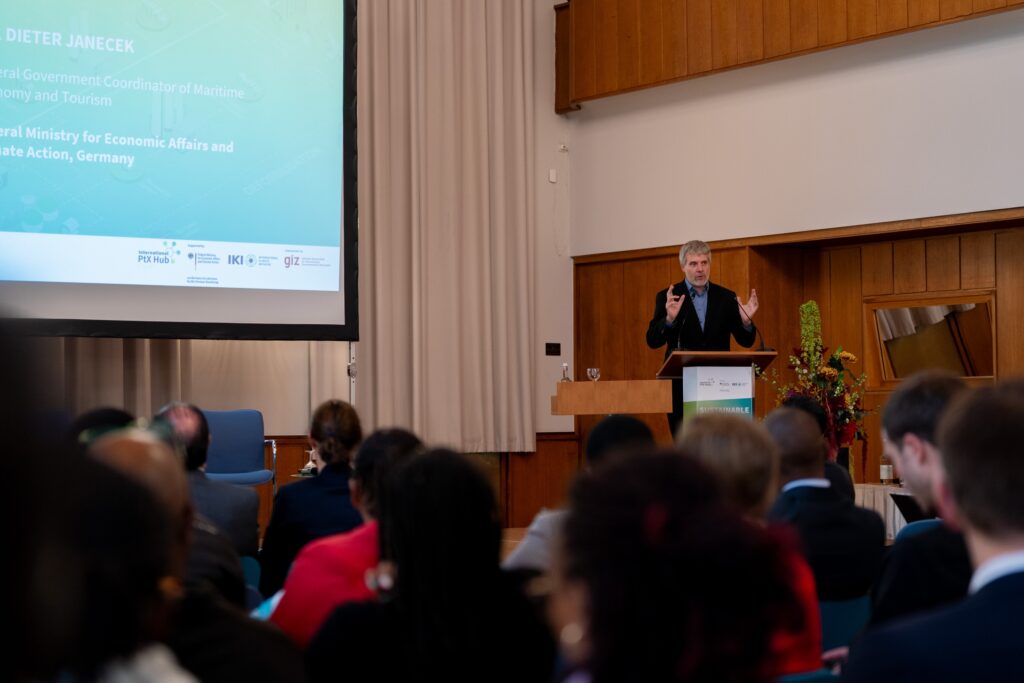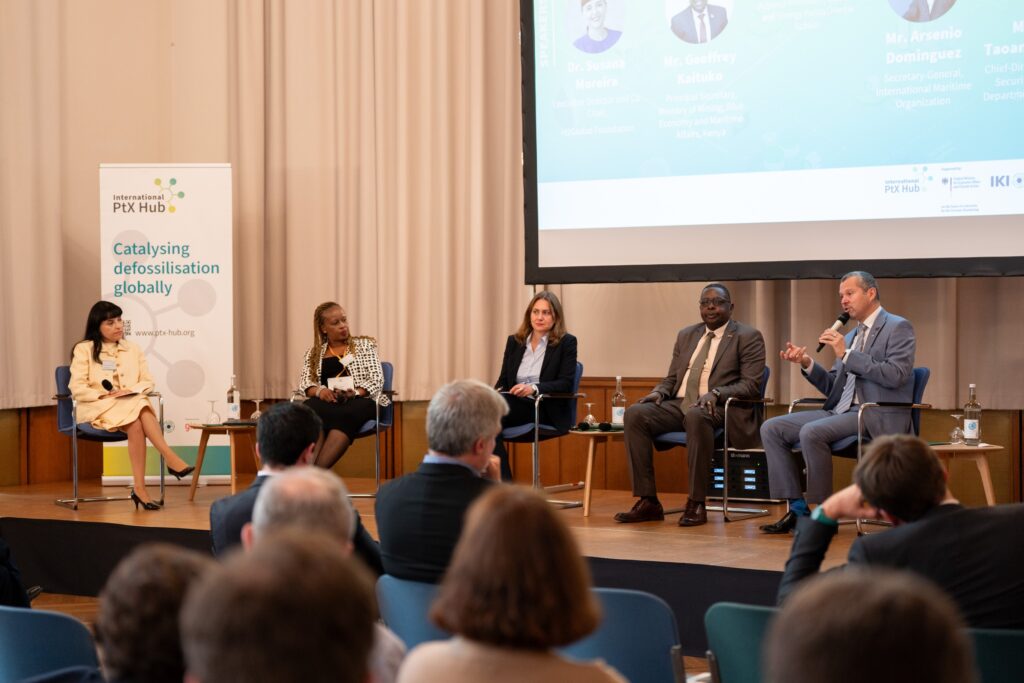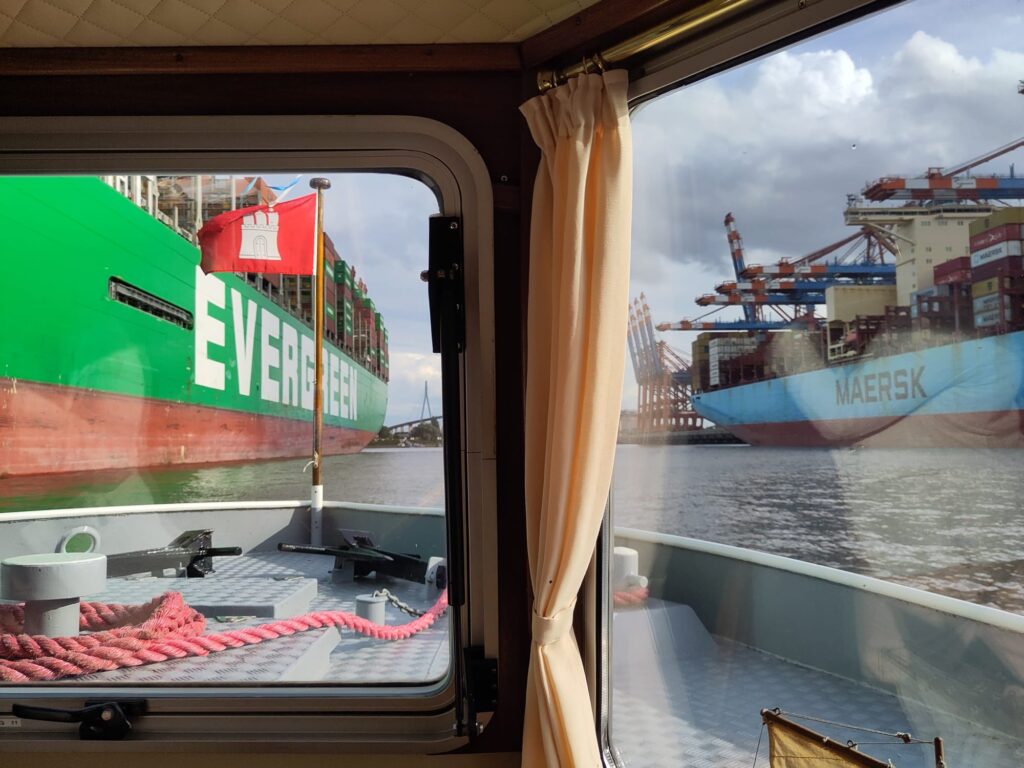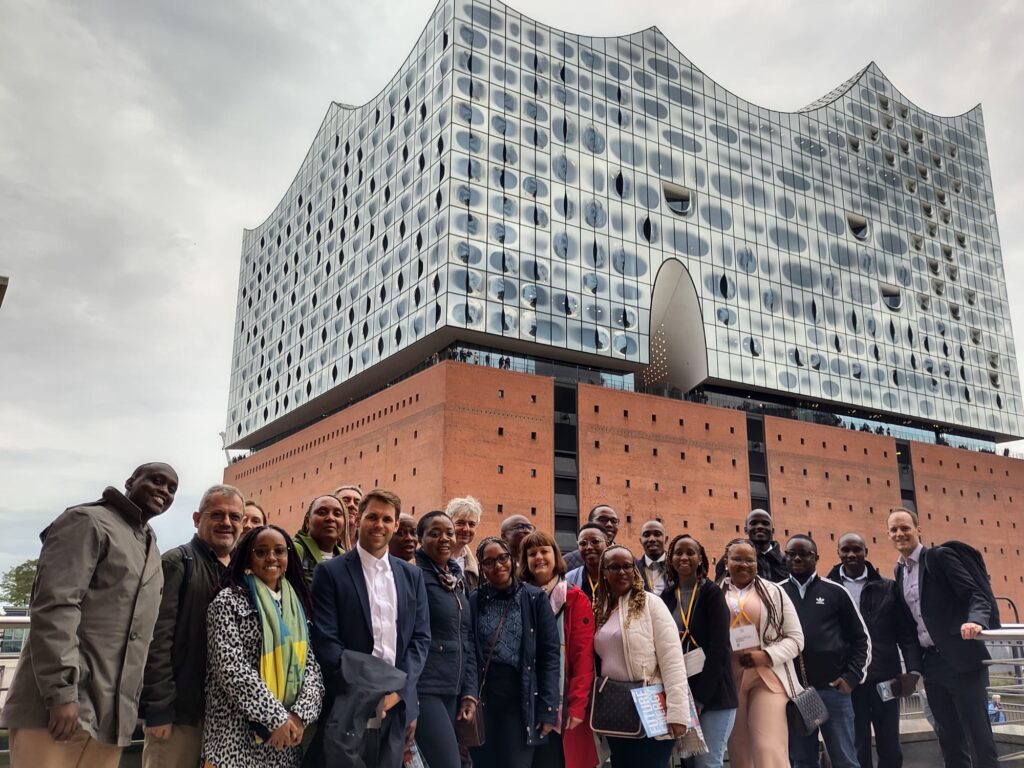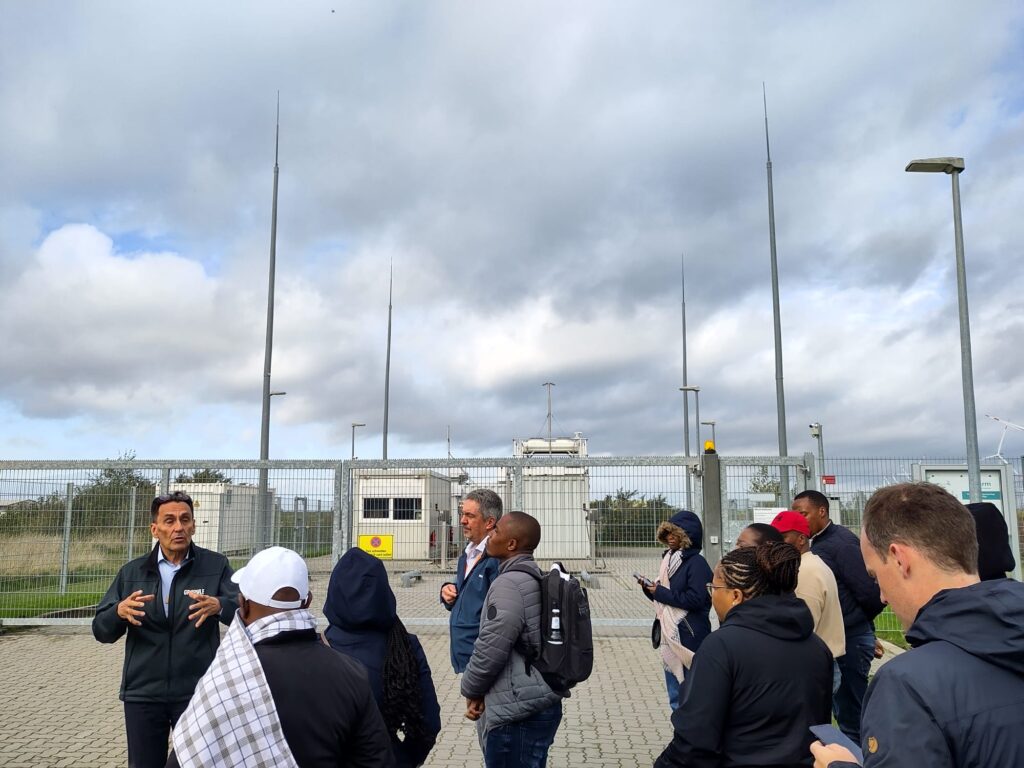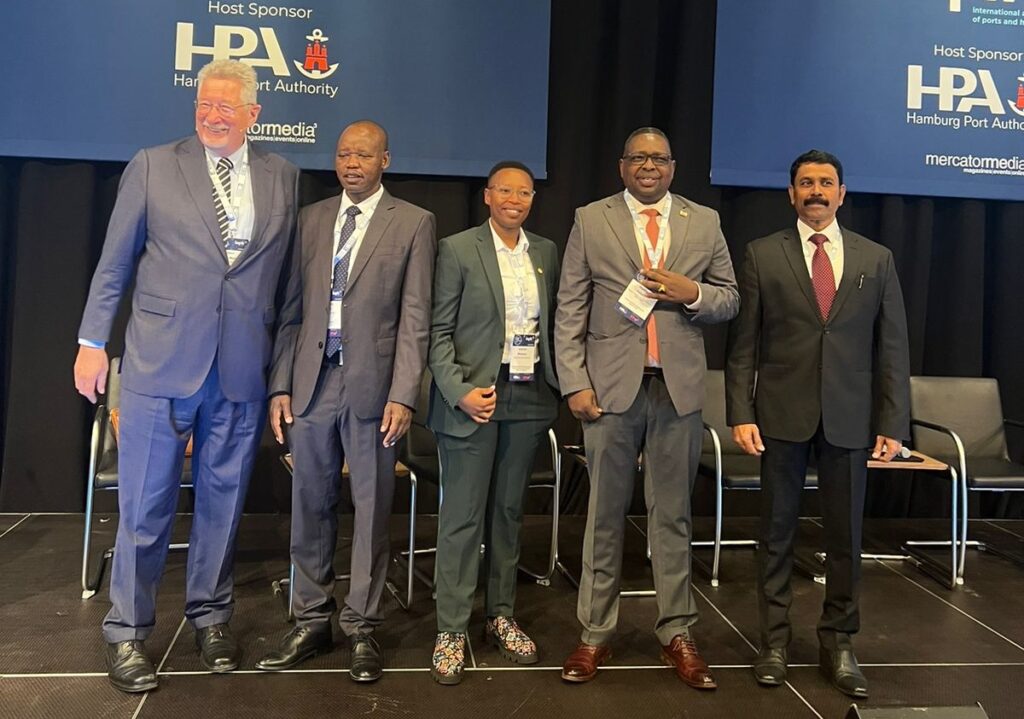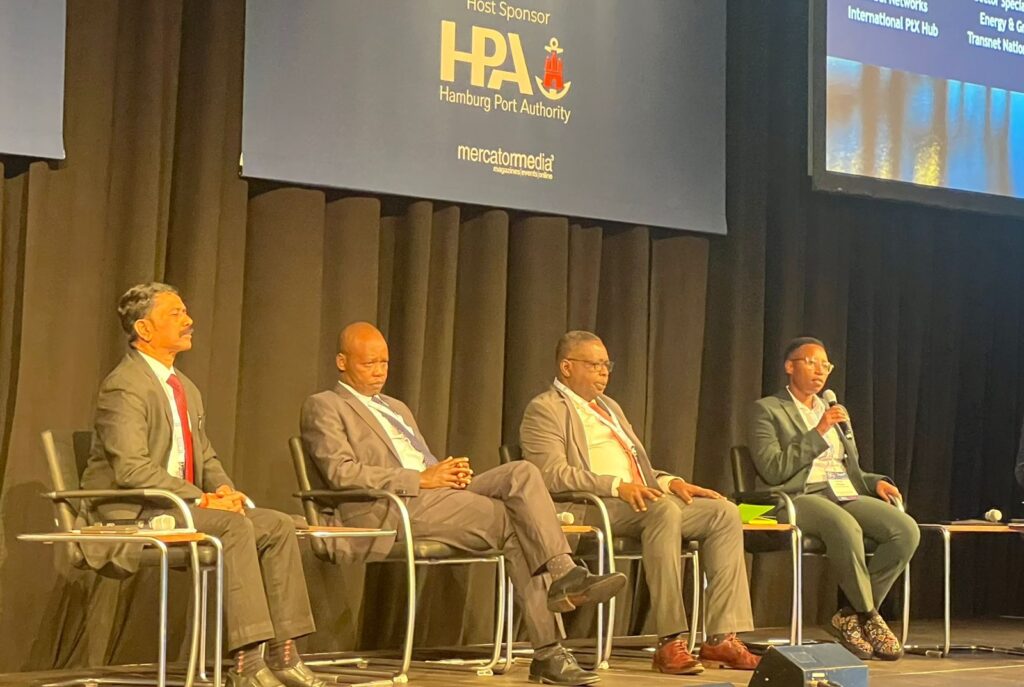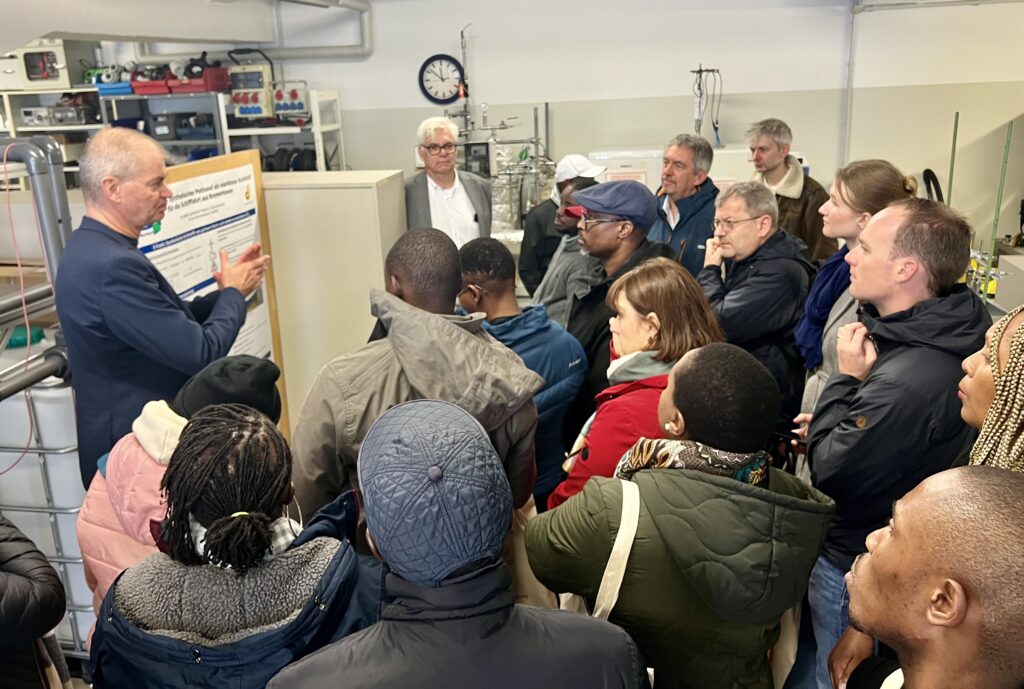“Collaboration is the key to defossilise shipping, more so than in other sectors.” The week-long tour to explore opportunities for green shipping began at the Hamburg Sustainability Conference. Around 30 delegates from Kenya and South Africa attended the inaugural edition of the high-level conference, which was held in Hamburg and opened by Mr Olaf Scholz, the Federal Chancellor of the Federal Republic of Germany. The Hamburg Sustainability Conference addressed critical issues of global sustainability, such as sustainable shipping and aviation, biodiversity and youth employment.
But to delve deeper into the theme of the week, sustainable maritime shipping, the PtX Hub’s official side event on Monday afternoon highlighted opportunities, challenges and existing solutions, such as the H2Global Foundation, for the transition to sustainable shipping.
The role of fuels, ports, and cooperation for sustainable maritime transport
The high-level welcome speakers, keynote speakers, and panelists highlighted the need for shared ambition, technological advances, and closer cooperation to enable the defossilisation of a sector so hard-to-abate as maritime transport. The recent World Maritime Day, with its focus on safety, made it clear from the outset that sustainable shipping is not just about climate action. It is also about issues such as safety, jobs, and efficiency. There is no better place to discuss this than in Hamburg, a city with a long history of shipping, innovation and progress.
Sustainable Marine Fuels, apart from energy efficiency measures, offer the greatest leverage currently available to reduce emissions, especially the so-called alternative fuel paths around e-methanol or e-ammonia, or drop-in fuels like e-diesel, that can be used in existing ship engines. European Union policies such as REDIII and REFuelEU provide important incentives to drive the transition to sustainable fuels.
Ports are often the backbone of a country’s economy and, thus, play a crucial role, e.g. through facilitating sustainable fuel paths, but also other measures to reduce emissions from the shipping sector. They can drive the transport and distribution of greener energy, but also need to adapt to climate change, such as to storms and sedimentation.
Collaboration is more important than ever in emerging markets such as Sustainable Marine Fuels. At the same time, regulation is only beginning to take shape. Green Shipping Corridors are a promising way to facilitate this closer cooperation, for example by allowing stakeholders to pool demand and agree on a fuel option for one shipping corridor.
Electrifying on-shore energy supply for cargo and passenger ships in the Port of Hamburg
On Tuesday, a boat tour introduced the delegates to the Port of Hamburg and its green ambitions. The visit was led by the Hamburg Port Authority and attended by the International Maritime Organization’s Secretary General Arsenio Dominguez. Three cruise terminals, which welcome 270 ships and 1 million passengers a year, are already supplied with electricity from the mainland. This is crucial as cruise ships require 15 MW and container ships around 5 MW of energy.
Using surplus electricity from sun and wind to produce green hydrogen
The next day, GP JOULE, a company pioneering the green hydrogen value chain 300 metres from the North Sea welcomed the delegations. Five electrolysers integrated with wind farms are already producing green hydrogen and supplying local buses and trucks. The aim is to build a regional ecosystem in North Frisia, which has become one of Germany’s most promising regions in recent years, largely due to the development of renewable energy. Companies like GP Joule can benefit from negative electricity prices when there is a surplus of electricity being produced. As renewable electricity is usually one of the main cost components for green hydrogen production, this significantly reduces the cost.
A tour of the small town of Husum concluded the day’s programme, demonstrating once again the region’s close ties to maritime trade and the sea, as well as its centuries-old adaptation to environmental change and protection from floods and storms.
International PtX Hub at the World Port Conference of the International Association of Ports and Harbors
Green shipping was also a much-debated topic at the World Port Conference with Heino von Meyer, Senior Advisor at the PtX Hub, moderating an insightful panel discussion. Organised by the International PtX Hub, distinguished representatives of government and port authorities from Kenya, South Africa, and India shared their perspectives.
They discussed the challenges and opportunities of transitioning towards green Power-to-X fuels and the role ports and green corridor initiatives must play in catalysing defossilisation and sustainable development solutions. It was encouraging to learn that the maritime sector has embarked on serious endeavours to meet the ambitious targets of the International Maritime Organisation of net zero greenhouse gas emissions by 2050.
Clear policy guidance, regulatory frameworks and market-based economic instruments are required. Yet, effective collaboration among the various stakeholders, at local, national, and international level will be the key to success.
Green hydrogen and e-methanol production at pilot and commercial scale
Later during the week, the South African and Kenyan delegations visited Bremerhaven. Mr Jochen Kreß, Head of Unit Environment and Climate Affairs, Free Hanseatic City Bremen – The Senator for Economy, Ports and Transformation, and Ms Friederike Woltmann, Project Manager Hydrogen and Power-to-X at the Institute of Shipping Economics and Logistics, joined the group for the day and warmly welcomed the delegates at the Fraunhofer Institute for Wind Energy Systems (IWES) platform of their unique electrolyser test field of the Hydrogen Lab Bremerhaven. Anna Heuschmann introduced the work of Fraunhofer IWES, one of 76 institutes and research facilities of the Fraunhofer-Gesellschaft, as one of the world’s leading organisations for applied research, continuously optimising hydrogen technologies and thus advancing the energy transition. Just the day before, the first green hydrogen left the test site.
Just across the harbour, the ttz Bremerhaven Technology Transfer Centre was the second stop of the day, highlighting its work as an independent research and development institution. Mr Gerhard Schories, Head of Institute, and Mr Ralf Lüken, Group Coordinator Innovative Energies at DS Energies Holding GmbH, provided the group with a tour of their laboratory and electrolyser. Especially the MariSynFuel, a large-scale e-methanol demonstration plant for the production of green shipping fuel with renewable carbon input from a nearby biogas plant, showcased a great example of regional collaboration between different research and business institutions.
Further downstream the Weser, the group later visited the impressive container terminal in Bremerhaven, one of the largest in Europe. Europort Group, who operates three terminals in Bremerhaven shared some of their visions for decarbonising port operations. The day ended with a visit of the Green Fuels GmbH start up that is just about to finalise the construction of a commercial green hydrogen production plant and a green hydrogen filling station in proximity of the port. Being part of HY.City.Bremerhaven GmbH & Co. KG, Andreas Wellbrock, Managing Founder of the Green Fuels GmbH, explained that the region aims to realise a green hydrogen economy for clean mobility and transport.
Insights gathered to accelerate the transition to sustainable shipping
The week-long delegation tour provided an invaluable opportunity for knowledge exchange and capacity building around the future of green maritime transport. With an emphasis on collaboration, the delegates from Kenya and South Africa gained firsthand insights into the advancements in green shipping technology, hydrogen production, and sustainable port operations in Germany. From the discussions at the Hamburg Sustainability Conference and the IAPH World Port Conference to the technical site visits, it became evident that the maritime sector is embracing the challenge of defossilisation, yet significant hurdles remain. Sustainable marine fuels, on-shore electrification, and green hydrogen are among the key solutions that will drive the transition, but their success will depend on effective policy, regulation, and cross-border cooperation. As seen throughout the visit, regional collaboration—whether through projects like MariSynFuel or innovations in port management—illustrates the potential for green corridors and coordinated efforts to scale these solutions globally. The journey toward net zero shipping is underway, and continued international partnerships will be essential in achieving the ambitious targets set for 2050.
Johannes Arndt and Philipp Wittrock contributed to this article.



